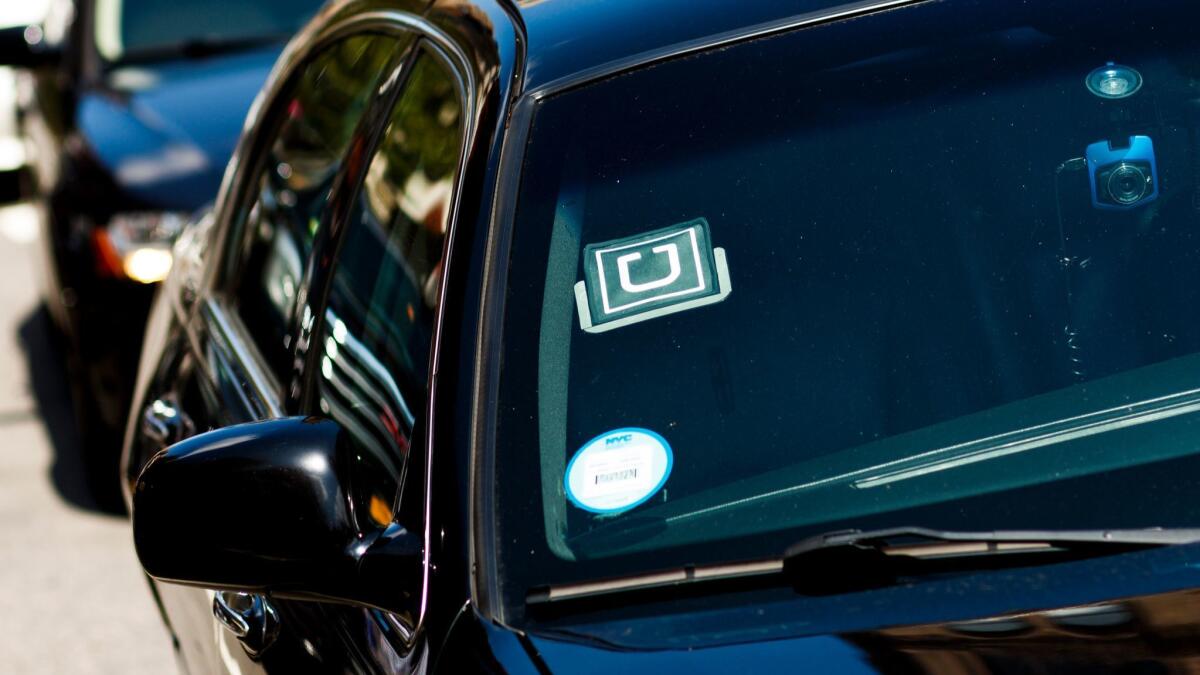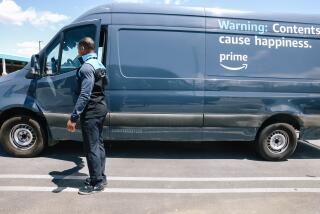Federal appeals court rules Uber can force drivers into individual arbitration, voids class-action

- Share via
Reporting from Washington — A federal appeals court Tuesday ruled that Uber can force its drivers into individual arbitration over pay and benefit disputes, voiding an effort by thousands of drivers to join in a class-action suit against the ride-hailing company.
The unanimous decision by a three-judge panel of the U.S. 9th Circuit Court of Appeals in San Francisco overturned a lower-court order that had certified the drivers’ class-action effort.
In the ruling Tuesday, U.S. Circuit Court Judge Richard R. Clifton cited a 5-4 U.S. Supreme Court decision in May that employers could enforce so-called arbitration agreements that require workers to give up the ability to collectively pursue claims that they were shortchanged or treated unfairly.
Uber said in a statement that it was “pleased with the court’s decision.”
But the legal dispute over how workers are classified in the so-called gig economy is complex and Tuesday’s decision might not be the end.
In addition to a potential appeal, the California Supreme Court weighed in this spring with a ruling that made it harder for employers to classify their workers as independent contractors. That state ruling doesn’t directly affect the case but could be a factor if Uber drivers in California take their cases to arbitration.
Current and former Uber drivers had filed suits starting in 2013 against the San Francisco company, saying it had misclassified them as independent contractors instead of employees. The classification means that drivers are responsible for their own work-related expenses such as gas, car repairs and insurance.
The drivers wanted to join together to sue Uber over the classification. But Uber said that they had to pursue their claims separately in individual arbitration cases. U.S. District Judge Edward Chen in San Francisco certified the class-action effort in 2015.
Shannon Liss-Riordan, a lawyer for the drivers, said that Tuesday’s decision was expected given the earlier Supreme Court ruling and that the drivers were considering an appeal to the full 9th Circuit.
In the meantime, she said they were urging Uber drivers nationwide who want to pursue claims against the company “to contact us immediately to sign up for individual arbitration.”
“Thousands of drivers have already signed up for individual arbitration,” she said in an emailed statement. “If Uber wants to resolve these disputes one by one, we are ready to do that — one by one.”
Eve Wagner, a mediator and arbitrator who has practiced employment law for 30 years, called the 9th Circuit decision “a staggering blow” to the drivers and their lawyers.
“It is much easier to have a class action than to have thousands of individual arbitrations,” she said, adding that some drivers who were part of the class may simply decide not to pursue the claims.
In a class action, most of the work is done by a few workers who represent the class. Now individuals will have to take a more proactive role if they want to press their claims, she said.
The California Supreme Court ruling in April said that in order to classify a worker as an independent contractor, businesses must show that the worker is free from the control and direction of the employer; performs work that is outside the hirer’s core business; and customarily engages in “an independently established trade, occupation or business.”
But that ruling applied to issues such as minimum wage, overtime and rest breaks. It does not apply to the work-related expense disputes at the heart of the federal case.
Once those cases go to arbitration, the drivers can cite the California Supreme Court decision, legal experts said. The California ruling applies only to workers who live in the state, Wagner said. Workers in other states would be governed by laws there, in addition to federal law.
Twitter: @JimPuzzanghera
Twitter: @mauradolan
UPDATES:
3:25 p.m.: This article was updated with additional information about the effect of the California Supreme Court decision on arbitration cases.
This article originally was published at 1 p.m.
More to Read
Inside the business of entertainment
The Wide Shot brings you news, analysis and insights on everything from streaming wars to production — and what it all means for the future.
You may occasionally receive promotional content from the Los Angeles Times.












